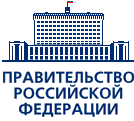Government of Russia
| Прави́тельство Росси́йской Федера́ции | |
 | |
| Information | |
|---|---|
| Established | 1993 |
| State | Russian Federation |
| Leader | Prime Minister |
| Appointed by | President |
| Main organ | Council of Ministers |
| Responsible to | State Duma |
| Headquarters |
White House Moscow |
| Website | government.ru |
The Government of the Russian Federation (Russian: Прави́тельство Росси́йской Федера́ции) exercises executive power in the Russian Federation. The members of the government are the Prime Minister of Russia (Chairman of the Government), the deputy prime ministers, and the federal ministers. It has its legal basis in the Constitution of the Russian Federation and the federal constitutional law "On the Government of the Russian Federation".[1]
According to the 1978 Russian Constitution, the President of Russia was a head of executive branch and headed the Council of Ministers of Russia. According to the current 1993 Constitution of Russia, the President of Russia is not a part of the Government of Russia, which exercises executive power. The Chapter 6 of the Constitution of Russia says, that "The Government of the Russian Federation consists of the Chairman of the Government of the Russian Federation, Deputy Chairman of the Government of the Russian Federation and federal ministries".
Overview
After the fall of the Soviet Union, the Russian Council of Ministers had become the main executive body. At some points it contained over 69 state committees, 16–17 ministers, 5 federal services, and over 46 governmental agencies. After the 2004 reform, government duties were split between 17 ministries, 5 federal services, and over 30 governmental agencies.
The prime minister is appointed by the president of the Russian Federation (currently Vladimir Putin), and confirmed by the State Duma. He or she succeeds to the presidency if the current president dies, is incapacitated, or resigns. The current prime minister is Dmitry Medvedev.
History
The body was preceded by Government of the Soviet Union. Since the Russian Federation emerged in 1991, the government's structure has undergone several major changes. In the initial years, government bodies, primarily the different ministries, underwent massive reorganization as the old Soviet governing networks were adapted to the new state. Many reshuffles and renamings occurred.
On November 28, 1991, President of the RSFSR Boris Yeltsin signed presidential decree No.242 "On reorganization of the government bodies of the RSFSR" (Russian: "О реорганизации центральных органов государственного управления РСФСР").
The most recent change took place on May 21, 2012 when President Vladimir Putin signed presidential decree on forming Dmitry Medvedev's Cabinet.[2][3]
Responsibilities and power
 |
| This article is part of a series on the politics and government of Russia |
|
|
|
|
|
Related topics
|
|
Politics portal |
The government is the subject of the 6th chapter of the Constitution of the Russian Federation. According to the constitution, the government of the Russian Federation must:
- draft and submit the federal budget to the State Duma; ensure the implementation of the budget and report on its implementation to the State Duma;
- ensure the implementation of a uniform financial, credit and monetary policy in the Russian Federation ;
- ensure the implementation of a uniform state policy in the areas of culture, science, education, health protection, social security and ecology;
- manage federal property;
- adopt measures to ensure the country's defense, state security, and the implementation of the foreign policy of the Russian Federation;
- implement measures to ensure the rule of law, human rights and freedoms, the protection of property and public order, and crime control;
- exercise any other powers vested in it by the Constitution of the Russian Federation, federal laws and presidential decrees.[4]
The government issues its acts in the way of decisions (Постановления) and orders (Распоряжения). These must not contradict the constitution, federal constitutional laws, federal laws, and Presidential decrees, and are signed by the Prime Minister.
Current Cabinet
The cabinet consists of the following members:[5]
See also
- List of heads of government of Russia
- Government of the Russian Soviet Federative Socialist Republic
- Government of the Soviet Union
- Russian Foreign Services
References
- ↑ Russian Government web portal – Text of 1997 Federal Constitutional Law "On the Government of the Russian Federation" (in Russian)
- ↑ Russian source, Vesti.ru
- ↑ New Cabinet Has Familiar Cast of Characters, Moscow Times, May 21, 2012
- ↑ The Constitution of the Russian Federation: Chapter 6
- ↑ Governmental Structure
- ↑ Russian source: Janna Odinsova was appointed as Aid to Prime Minister, Vesti.ru
External links
- Official website of the Government of Russia
- Organigram of the federal executive bodies at government website (Russian)
| ||||||||||
| ||||||||||||||||
| ||||||
| ||||||||||||||||||||||||||||||||||||||||||||
| ||||||||||||||||||
| ||||||||||||||
